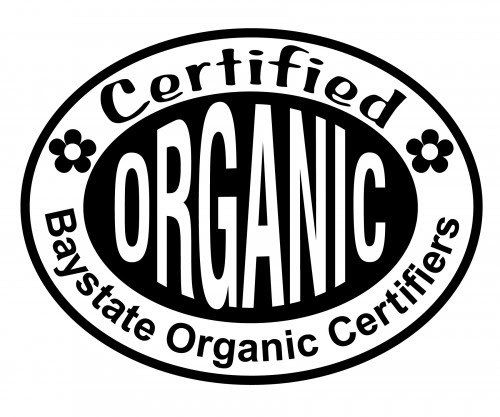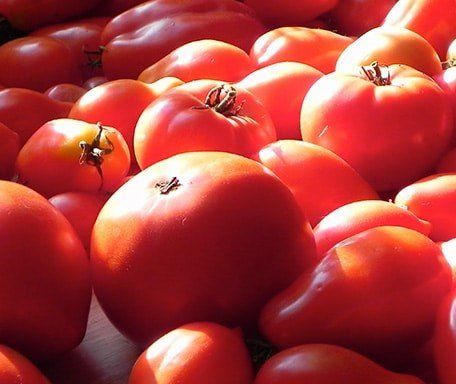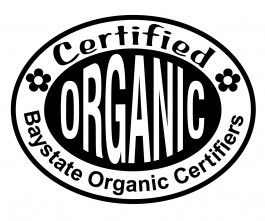Well, the heavy rains have brought a few items to a close sooner than we had hoped, such as the heirloom tomatoes, cucumbers and zucchini. But we do have more regular tomatoes out there, and a new planting of summer squash should be coming in soon. The butternut squashes planted for the fall seem the worst off, with many of the young fruits rotten on the vine in standing water.

 Lettuce and other leafy greens like the rain though, and are rejoining the harvest and we are hopeful to be able to get some melons to folks this week and/or next. As melons grow on the ground (lately in mud) please be sure to wash them thoroughly before cutting, and store them in refrigeration.
Lettuce and other leafy greens like the rain though, and are rejoining the harvest and we are hopeful to be able to get some melons to folks this week and/or next. As melons grow on the ground (lately in mud) please be sure to wash them thoroughly before cutting, and store them in refrigeration.
There are a lot of food labels used out there without any legal definition, e.g. “natural,” “no-spray,” “hormone-free,” and even “local,” so we feel it is important for our members to know how we do things. Last week we completed the on-site inspection phase of our tenth annual Organic Certification through the Baystate Organic Certifiers agency. In the 7 hours of interviewing and touring, we presented all of our crop plans, seed receipts, planting logs, harvesting records, cleaning methods, product tracing system and anything else that the inspector deemed necessary from our farm operations over the past year, since the last inspection.
 We are proud to be a USDA Certified Organic farm, but some people may wonder what exactly does that mean? Primarily, it means that our commitment to our members to provide you with produce -- free of synthetic fertilizers, pesticides, herbicides and genetically-modified organisms -- which has been grown in a manner that is sustainable and respectful of the natural environment, goes beyond just our promise to you.
We are proud to be a USDA Certified Organic farm, but some people may wonder what exactly does that mean? Primarily, it means that our commitment to our members to provide you with produce -- free of synthetic fertilizers, pesticides, herbicides and genetically-modified organisms -- which has been grown in a manner that is sustainable and respectful of the natural environment, goes beyond just our promise to you.
 As stated by the CT Department of Agriculture “[the National Organic] program includes organic standards, prohibited practices, requirements producers need to meet, and the list of allowed and prohibited materials. The complexities of this certification have created the hardest commodity standards any producers have to comply with.
As stated by the CT Department of Agriculture “[the National Organic] program includes organic standards, prohibited practices, requirements producers need to meet, and the list of allowed and prohibited materials. The complexities of this certification have created the hardest commodity standards any producers have to comply with.
The grower or livestock producer who wishes to become certified organic must provide proof of using approved USDA organic standards and methods. These standards and methods integrate cultural, biological, and mechanical practices that foster cycling of resources, promote ecological balance, and conserve biodiversity. All growers or livestock producers wishing to market their products as certified organic must follow the laws that regulate the creation, production, handling, labeling, and trade of their organic products. These producers are also subject to random sampling verifying these practices are being followed.
Through these methods, the integrity of organic products is maintained, and with the inspections and product testing, consumers can purchase these items with confidence, knowing organic standards are being followed.” A farmer must produce three years of Organic-compliant land history records before you can be eligible to apply for Organic certification. Once certified, you are required to keep extensive records of all seed sources, crop rotation plans, pest management, nutrient stewardship, and soil testing. A written audit is performed annually along with an onsite inspection and random tissue sampling to validate compliance.
We, at Oxen Hill Farm, are proud to be in our tenth season of Organic produce certification, and thirteenth season of organic management practices.

Another label that many folks are talking about is “Non-GMO.” There are some foods on the market today that include ingredients from organisms that have been modified to contain DNA from other organisms in order to transfer certain properties, traits, or characteristics to that new organism. These items with combined DNA are commonly called “GMOs,” which stands for Genetically Modified Organisms.
 Gene editing is an interesting new technique, where plant scientists have been able to isolate areas of a plant's DNA that are responsible for certain traits, (such as how apple flesh will turn brown on the surface when exposed to air) and "turn them off." They may be classified differently than the "old-school" GMOs, as they have not had any foreign DNA included in their genome, rather had their own cut out or silenced, but in terms of the meaning of "modification," they have certainly been modified. It remains to be seen how such technology will be labeled and handled. We do not use any seeds from crops that have been gene-edited.
Gene editing is an interesting new technique, where plant scientists have been able to isolate areas of a plant's DNA that are responsible for certain traits, (such as how apple flesh will turn brown on the surface when exposed to air) and "turn them off." They may be classified differently than the "old-school" GMOs, as they have not had any foreign DNA included in their genome, rather had their own cut out or silenced, but in terms of the meaning of "modification," they have certainly been modified. It remains to be seen how such technology will be labeled and handled. We do not use any seeds from crops that have been gene-edited.
Foods may be “Non-GMO” without being Organic, as the Non-GMO status only addresses the genetic material of the food; while USDA Organic certification will always exclude any GMOs. All of our products are both free of GMOs and have been grown using practices compatible with their Organic certification.
Some of the produce you receive has been rinsed from the field, but like all fresh produce, should be thoroughly washed and, usually, refrigerated by you at home.




